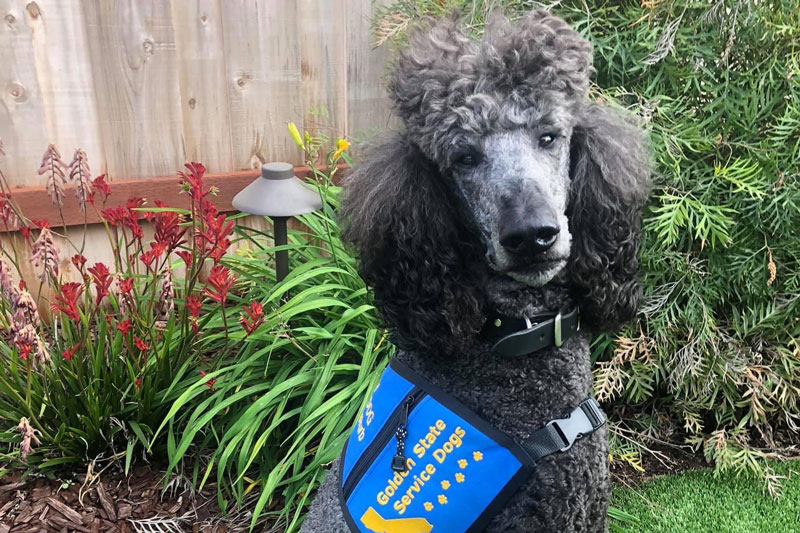
Quincy to the Rescue!
By Terry L. Wilson
According to the United States Service Dog Registry, more than 50,000 four-legged lifesavers are hard at work in the United States.
Quincy, a standard poodle, is one of those hard-working animals, and he has become a very popular member of the Scripps Ranch community, especially with the students at Marshall Middle School (MMS).
Quincy’s human is Susan Beisel, a science teacher at MMS, and like thousands of others, she requires the help of a service dog due to a medical condition.
One of her needs was to find a sneeze-proof dog. Beisel searched for a hypoallergenic canine that would stand steady and was also big enough to help his human get up and down, and it had to be a very smart dog to learn and perform all the necessary service functions Beisel required.
“Part of selecting a service dog is letting the dog select you, instead of you selecting him. Many of the breeders I contacted wanted to pick a dog for me. I said, ‘No, I can’t do that.’ I want a dog that isn’t just another pretty face, he must be smart and he must pick me too,” Beisel said.
“I began working with Susan Cook, who primarily sells hunting dogs known for having a good nose, and that’s very important because how the dog signals me is by scent,” Beisel explained. “My body chemistry changes and that is how the dog knows to alert. I knew Quincy was the one when instead of running off with his siblings to play, he snuggled up to me and put his head on my lap.”
Service dogs have a lot of rules to follow; subsequently not every pooch is cut out for the job. Poodles can be very high-spirited, but Quincy was the exception, being a very mellow and stable dog.
“Quincy is not allowed to bark unless it’s to alert me,” Beisel said. “He cannot have any prey drive … and when we’re working, if a squirrel, bunny or cat is near, Quincy isn’t even allowed to recognize them. He cannot be distracted because it puts me at risk.”
To learn all these new behaviors, Quincy went to school at Golden State Service Dogs in Chula Vista. Beisel and her new companion trained side-by-side, attending classes once a week and weekends for two years.
“At the end of this process I had to log 200 active training hours, so Quincy has his own Instagram account,” Beisel said. “Quincy also had to pass multiple tests before he would receive his official Golden State Service Dog vest. The vest is like a diploma verifying that he has reached national accreditation. So, wherever I go Quincy is registered with the Humane Society – a large gold coin on his collar certifies that he’s nationally accredited.”
To keep the vest, Quincy must do an additional 100 hours that are documented in writing and photos that are posted on his Instagram page.
“Right now, the COVID has us doing remote teaching. But when I take Quincy to class he has a crate and he has a bed on opposite sides of my desk, and he knows that is where he must stay unless it’s to signal me. If there is a problem, Quincy will signal me by barking or by striking me with his paw,” Beisel said.
“I explain to the kids that when Quincy is wearing his vest, he knows he’s working; but when I take it off he runs around the classroom like the village idiot. He knows it’s playtime, Beisel added. “Once a month (before COVID-19) we have, ‘Touch Me Tuesday’ and ‘Freedom Friday,’ and allow the kids to pet and play with Quincy. They absolutely love him.”
Because Beisel teaches and enjoys science, she named her canine sidekick after the popular 1970s TV show “Quincy, M.E.” featuring a Los Angeles medical examiner (played by Jack Klugman) who utilizes science to help solve police investigations.

